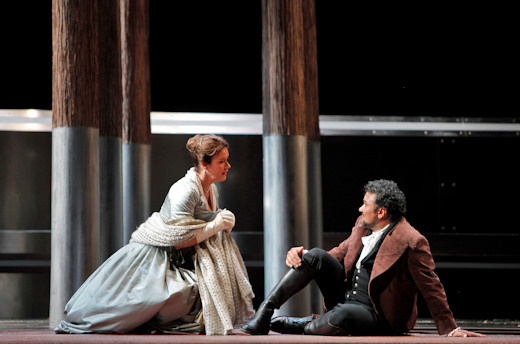Other Links
Editorial Board
-
Editor - Bill Kenny
Assistant Webmaster - Stan Metzger - Founder - Len Mullenger
Google Site Search
SEEN AND HEARD OPERA REVIEW
Massenet, Werther:
Soloists, chorus and orchestra, Emmanuel Villaume, conductor. San Francisco Opera, War Memorial Opera House, San Francisco. 15.9.2010 (HS)
Cast:
Werther:
Ramón Vargas
Charlotte: Alice Coote
Sophie: Heidi Stober
Albert: Brian Mulligan
The Bailiff: Christian Van Horn
Schmidt: Robert MacNeil
Kätchen: Susannah Biller
Brühlmann: Austin Kness
Johann:
Bojan Knezevic
Production:
Conductor:
Emmanuel Villaume
Director: Francisco Negrin
Production Designer: Louis Désiré
Lighting
Designer: Duane Schuler

Charlotte (Alice Coote) and Werther (Ramón Vargas)
Picture © Cory Weaver
Americans
understandably have a difficult time relating to the story of
Werther. In Massenet’s opera, the title character falls madly
in love with a woman, who has momentarily forgotten that she is
promised to another. Werther, crushed, threatens suicide, but doesn’t
actually do it until the final act (or there wouldn’t be an
opera). Meanwhile, he obsesses over her, pretends to be friendly to
the family, and writes her poetic letters. An American guy in his
position would shrug it off and maybe take a second look at
Charlotte’s little sister, Sophie, who so clearly has a crush
on him.
It’s
a downer, no doubt about it. In hopes of injecting life into it, San
Francisco Opera’s new staging, a co-production with Lyric Opera
of Chicago, which debuted Wednesday, tosses out the stage directions
and messes with the story. On some level, director Francisco Negrin’s
changes do work. On another, they just cause confusion.
He raises
the stage a couple of meters to make a crowded space for Werther’s
scruffy apartment downstage, where, instead of disappearing offstage,
he can retreat throughout the opera to obsess over Charlotte and
paint her name on a long black wall, gazing at her image as it flits
across his flat-screen TV. The stage is enclosed by a stainless steel
fence and dominated by several stylized trees. Characters climb over
a stack of suitcases, armoires and boxes (belonging to Charlotte’s
recently departed mother?).
In the
climactic suicide scene not one, not two, but three Werthers shoot
themselves on stage, not in Werther’s apartment. Two of them
roll off stage as the tenor sings the long final scene as a ghost
whispering in a distraught Charlotte’s ear. This has the
advantage of relieving the tenor of having to sing on his back, and
therefore probably improved the music. But it also introduced ideas
that were not there in the original libretto.
Although
turning Werther into
an existential psychological study not only adds extra layers, for
better or worse, it changes the story substantially. In the famous
letter scene, Charlotte (alone on Christmas Eve, says the libretto)
reads Werther’s missives in the presence of her long-suffering
husband, Albert. Would she really be that thoughtless or
mean-spirited? Knowing this certainly underlines Albert’s
motivation to accede to Werther’s request to borrow his dueling
pistols.
In the
long instrumental interlude before the death scene, we see what seems
to be a dream sequence in which Werther and Charlotte finally
consummate their passion—sort of; they remain clothed. All this
activity also robs Charlotte’s line to the dying Werther, “Here
is the kiss you wanted,” of its power.
Fortunately,
a luminous performance of Massenet’s music by the orchestra,
shaped with depth and flair by Emmanuel Villaume, and praiseworthy
efforts by the singers, led by tenor Ramón Vargas as Werther
and Alice Coote as Charlotte, made up for any directorial confusion.
Vargas
used his silken lyric voice to shape phrases with refinement.
Although he held back on high notes, he sang with precision and
created a character with fatal human flaws. The big aria, “Pourquoi
me reveiller?” had everything but
thrilling high notes at the climax. Coote, who has been heard in San
Francisco before only in Händel and Mozart, made a comfortable
musical match with Vargas’ lightweight sound. She sang
Charlotte’s music with similar precision, neatly shaping the
phrases and making them flow smoothly even when the building tensions
may have warranted something a bit more unbuttoned. Her letter scene
came off as wistful and regretful rather than pulsating with passion.
(Originally, Elina Garanca was scheduled to sing this role in a
company debut, but bowed out last spring for “personal
reasons.”)
Soprano
Heidi Stober made an impressive company debut as Charlotte’s
teenage sister Sophie. With her clear, agile voice she provided some
brightness in a dark story. Baritone Brian Mulligan, last heard here
as Marcello in 2008’s La Bohème,
sang with plangency as a sympathetic Albert. Among the rest,
bass-baritone Christian van Horn fussed engagingly as Charlotte’s
widowed father, The Bailiff, while bass Bojan Knezevic and
bass-baritone Austin Kness had fun with their roles as his
ever-drinking pals.
In the
end, for all the directorial glosses, Massenet’s music carried
the day, especially in the extraordinarily fine sounds coming from
the orchestra pit. And, if the lead singers can loosen up a bit, the
remaining performances (through Oct. 1) could be even more rewarding.
Harvey
Steiman
